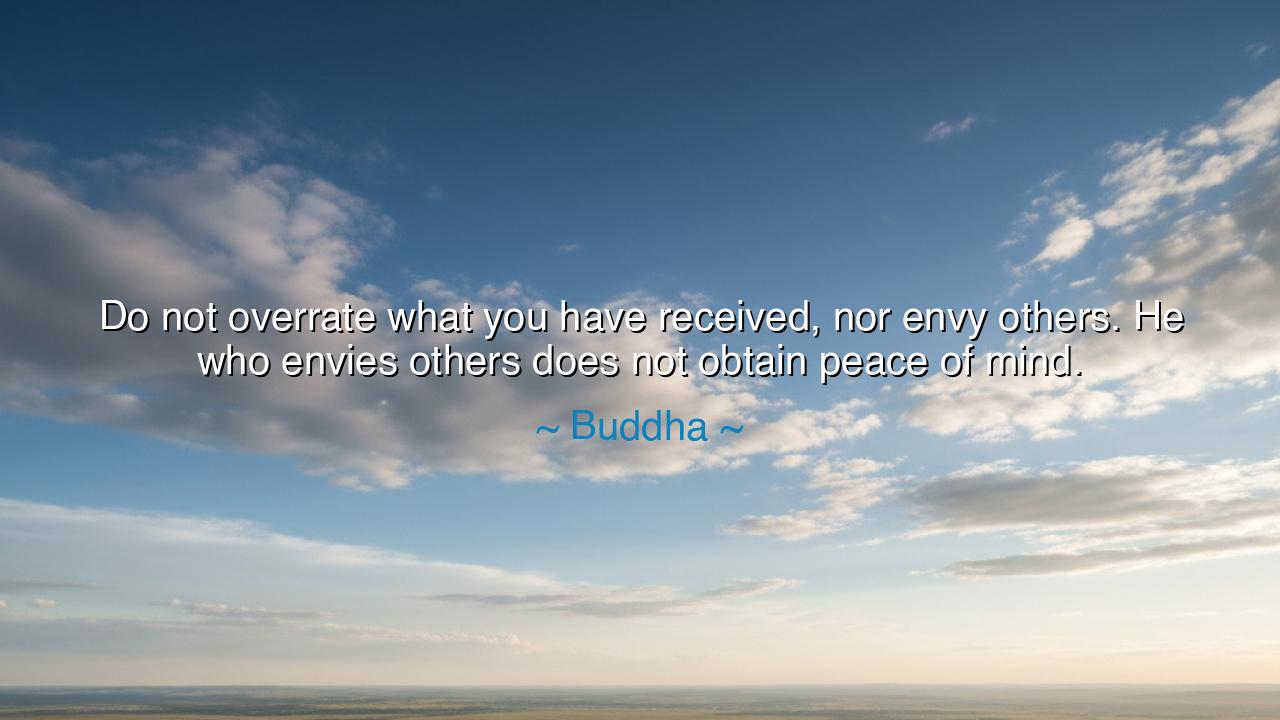
Do not overrate what you have received, nor envy others. He who
Do not overrate what you have received, nor envy others. He who envies others does not obtain peace of mind.






The words of the Blessed Buddha — “Do not overrate what you have received, nor envy others. He who envies others does not obtain peace of mind.” — are like cool water poured upon the fire of human desire. In them lies a teaching for all ages, a call to free the heart from the restless chains of comparison. For envy is a shadow that steals joy from the soul, and attachment to possessions blinds us to the treasure already resting in our hands. The Buddha, in his boundless compassion, sought to teach that liberation comes not from craving what others possess, but from resting in contentment and gratitude.
To overrate what one has received is to mistake the passing gift for eternal wealth. Wealth, titles, honors, beauty — these things are fleeting. They are but leaves blown by the wind of time. If one clings to them, they become burdens that corrupt the heart. And to envy others is to wound oneself doubly: first by denying gratitude for one’s own blessings, and second by poisoning the mind with longing for another’s fate. Thus, the one who envies loses their own joy and gains nothing in return.
History has borne this lesson countless times. Consider the story of King Ahab of Israel, who had lands, wealth, and power, yet still burned with envy for Naboth’s humble vineyard. Though he possessed a kingdom, his envy led to treachery and bloodshed. Did his envy bring him peace of mind? No, it brought ruin upon him and his house. Meanwhile, Naboth, though stripped of life itself, held his integrity until the end. The tale reveals that envy corrupts the mighty and blinds them to the abundance they already possess.
But there are brighter examples too. Take the life of Mahatma Gandhi. He lived simply, owning almost nothing, yet his spirit overflowed with wealth far greater than kings. He did not envy the powerful of the earth, nor did he cling to the little he had received. His heart was light, and in that freedom he gained the strength to lead millions. His true treasure was his peace of mind, born not from possessions or comparisons, but from surrender to truth and love.
The teaching of the Buddha is therefore not one of denial, but of freedom. He does not say, “Reject all gifts,” but rather, “Do not overrate them.” Receive them with gratitude, use them with wisdom, but do not let them rule your soul. And when you see others prosper, rejoice in their fortune rather than let envy fester. In this way, you cultivate joy not only for yourself but for all beings, expanding the circle of peace.
The lesson is clear: to walk the path of serenity, you must cut away envy as one pulls weeds from a garden. Look not at what others have with bitterness, but with blessing. And look at what you hold not with pride, but with gratitude. In this balance you will discover the secret of lasting peace of mind, a jewel brighter than any treasure of gold.
Practical steps may be small, yet powerful. Each day, give thanks for what you have received, no matter how little. When envy arises, pause and breathe, transforming it into admiration or inspiration. If your heart desires what another has, let that desire become a teacher, showing you what qualities to cultivate rather than what possessions to steal. By training the mind in gratitude and compassion, you will fortify your soul against the poison of envy.
So remember, child of tomorrow: do not overrate, do not envy. For what you cling to will fade, and what you covet will burn you. Seek instead the treasure that never withers — the calm of the heart, the joy of gratitude, the radiant jewel of peace of mind. This is the path the Buddha taught, the path that leads not to sorrow, but to freedom everlasting.






AAdministratorAdministrator
Welcome, honored guests. Please leave a comment, we will respond soon